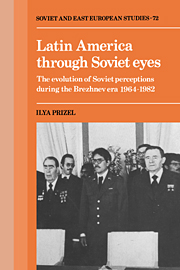 Latin America through Soviet Eyes
Latin America through Soviet Eyes Published online by Cambridge University Press: 05 February 2012
Although the preponderant power of the United States in Latin America played a pivotal role in forming the Soviet perception of the region, and indeed often influenced the extent of Soviet willingness to become involved in the hemisphere's affairs (either itself or through Cuba), it was nevertheless the perception of the domestic correlation of forces that ultimately determined the Soviet prognosis of Latin America's political future. The usual Western analysis of changing Soviet attitudes, which correctly identifies the time periods involved, is weak in that it assigns primary importance to external forces acting on Latin America rather than to regional domestic realities. Thus, the course of Soviet attitudes is characterized as follows: (1) Between 1960 and 1962, when the USSR – buoyant, due to the Cuban revolution – expected a rapid repetition of similar wars of national liberation throughout the region. (2) Between 1962 and 1968, when the USSR was chastened by the confrontation with the United States during the Cuban missile crisis and consequently abandoned the notion of wars of national liberation in Latin America but continued to express verbal support (so as not to be upstaged by China as the world leader of the left). (3) Between 1968 and 1980, when the USSR, no longer concerned by the Chinese challenge and far more interested in détente with the United States, cracked down on Castro's efforts to “export revolution” and downplayed its belief in the viability of wars of national liberation.
To save this book to your Kindle, first ensure [email protected] is added to your Approved Personal Document E-mail List under your Personal Document Settings on the Manage Your Content and Devices page of your Amazon account. Then enter the ‘name’ part of your Kindle email address below. Find out more about saving to your Kindle.
Note you can select to save to either the @free.kindle.com or @kindle.com variations. ‘@free.kindle.com’ emails are free but can only be saved to your device when it is connected to wi-fi. ‘@kindle.com’ emails can be delivered even when you are not connected to wi-fi, but note that service fees apply.
Find out more about the Kindle Personal Document Service.
To save content items to your account, please confirm that you agree to abide by our usage policies. If this is the first time you use this feature, you will be asked to authorise Cambridge Core to connect with your account. Find out more about saving content to Dropbox.
To save content items to your account, please confirm that you agree to abide by our usage policies. If this is the first time you use this feature, you will be asked to authorise Cambridge Core to connect with your account. Find out more about saving content to Google Drive.